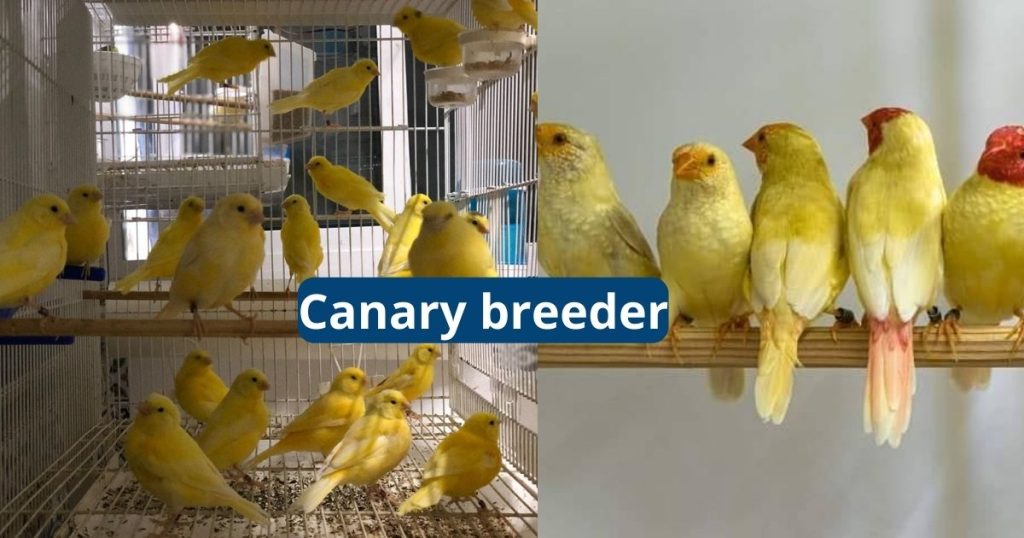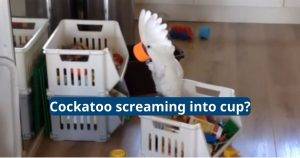Canary Breeder

Canaries are easy to keep, but breeding them requires a lot of advance planning, specialized equipment and specific food. It is advisable only to breed them if you are prepared to care for all of the resulting chicks. Watch for breeding behavior, which begins with the male courting the female. When she is ready, she will crouch down and mate with him in short, successive bursts.
Breeding
There are a number of special supplies needed for breeding canaries. A large cage that has a divider in it is a must, as is a nesting box and some paper or strings for the female to use for building a nest. There are also supplements that can be purchased which help the birds to become more breeding-ready. These products usually contain high-protein foods and other ingredients that give the canaries a boost in nutrition.
Healthy male and hen canaries often indicate their breeding readiness by singing frequently and by collecting papers and string to build nests. You can start by placing them in a paired cage together when you see this behavior.
It is also important to keep your canary pair in a warm area, away from drafts and air conditioning units and from windows that receive direct sunlight (the canaries can get overheated). They need vitamin enriched seed, fresh fruits and vegetables, soaked seeds and other food preparations that provide vitamins and minerals.

Care
Canaries are hardy birds that can be acclimated to living in many types of homes. The bird needs a spacious cage or aviary that is large enough for it to spread its wings and fly around in. They like to have several perches. They also require a clean environment that is free of fumes and swift temperature changes.
Before breeding canaries you should purchase a male and female and place them in separate cages, or in special breeder cages with dividers to get them used to each other without touching. A male canary will begin to whistle when he is ready to breed. A female will usually start tearing paper and preparing her nest when she is in breeding condition.
Once the babies are born it is important to keep them warm and fed regularly. The young should be checked several times a day to make sure their crops are full. A good mother can care for her young, but in some cases a female will neglect her babies, or even toss them out of the nest.

Feeding
Canaries are relatively easy to care for as long as they have a comfortable cage and you provide them with all their basic needs. They need clean water, food and regular exercise to prevent obesity. They also need a safe and stimulating environment and ongoing healthcare.
Breeding canaries are more demanding than the pet types because they need additional protein in their diets to reach their genetic potential and produce strong chicks. Traditionally egg food, soaked seed and soft foods have been used to fulfil these energy requirements in breeding canaries. However, they are often complex to prepare and require strict hygiene during the sprouting process as fungus can spoil the seed.
Canary pellets are a more hygienic and nutritious alternative to dried seeds. They are easier to digest and fortified with vitamins and minerals to meet the nutritional requirements of breeding canaries. They can be fed alongside seed or mixed with it. The pellets are also a great way to encourage young canaries to explore new tastes without scaring them with an uncovered, open bowl of seed.

Health
Canaries make good house pets and can be entertaining, especially when they sing. They are generally nondestructive and do not require frequent handling. Often, they become more lively and vocal during breeding season. The canary is a small bird that is characterized by its colorful feathers and sunny disposition. It is also an effective companion for a person with allergies, since it does not squirm or carry droppings around the home.
Canary breeders should quarantine and test new birds for diseases. They should then provide the canary with a fresh, high quality, toxin-free diet that is appropriate for canaries. It is important to keep the cage clean, provide plenty of water and provide multiple places for the canary to perch.
Canaries are easy to breed in captivity if the pair is healthy and both birds are in breeding condition. As daylight lengthens, canaries synchronize their breeding cycles to coincide with the natural increase in plants and insects that form their main source of food in the wild. A nutritious diet is essential, and the canary hen should be provided with a protein boost during the breeding season to support her incubating chicks. This can be accomplished by offering a boiled egg, commercial ‘egg food’ or mashed, finely chopped, hard-cooked eggs.



